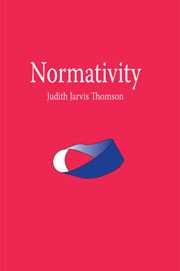"Normativity is a careful, rigorous account of the meanings of the basic normative terms: good, virtue, correct, ought, should, and must. Along the way, Thomson refutes almost everything other philosophers have said about these topics. It is a very important book."
— Gilbert Harman, Princeton University
Groundbreaking treatise
Is there such a thing as an ideal world, one to which people are striving when they make judgments about what is "good" or "bad"? Is saying a person is "good" the same as saying a toaster is "good?" Is "correctness" the same as "goodness?"
These and other fundamental ethical questions were up for debate as distinguished moral philosophers gathered at MIT on June 11 for a daylong conference on Normativity — a groundbreaking treatise by MIT philosophy professor emeritus Judith Jarvis Thomson. An expanded version of Thomson's Carus Lectures, the treatise illuminates the branch of philosophy concerned with value.
“Debate was vigorous, lively and good humored — in all the ways that humor can be good!” said Professor Richard Holton, head of the Philosophy Section, who planned the conference, which filled Room D461 at the Stata Center to capacity.
Distinguished moral philosophers gather
Providing context for the event, Holton noted, “Ethics has always been a central question in philosophy, both because many people look to philosophy for answers on what we can do, and because it can seem hard to fit ethics into our picture of the world. Judy has never been shy of using philosophy to say what we can do (she has, for example, famous views on the rights of abortion and of self-defense), but in this volume she is concerned with the more theoretical question of the nature of ethics, and of normativity more generally.”
Some of the most important moral philosophers of the day attended the gathering, among them Professor Frances Kamm of Harvard University and Professor Jonathan Vogel of Amherst College. Three eminent scholars gave presentations at the event: Michael Smith, the McCosh Professor of Philosophy at Princeton University; Peter Railton, the John Stephenson Perrin Professor of Philosophy at the University of Michigan; and Gideon Rosen, the Stuart Professor of Philosophy and chair of the Council of the Humanities at Princeton.
Thomson concludes that "consequentialism" is flawed
One major conclusion Thomson draws in her work is that the theory called "consequentialism," which argues that goodness is determined by what will maximize happiness, is fatally flawed.
“There are many classical objections [to consequentialism],” Thomson said. “For example, what if by killing one person I could make people as a whole a lot happier? That’s not going to make it OK to kill the one. So that theory looks just false. A deeper objection is that it is incoherent.”
"This much anticipated book intriguingly and surprisingly broadens the scope of the philosophy of normativity. Impressively broad and deeply insightful."
— Ernest Sosa, Rutgers University
How things ought to behave
Thomson’s ambitious book separates normative judgments into two sub-kinds: directives, which concern what people ought to do (or what functions objects ought to perform); and evaluatives, which deal with how well someone or something performs.
Examples of directives include that A ought to be nice to his brother and that B ought to mop up that spill. Examples of evaluatives include that C is a good soccer player and that D is a good toaster, as well as that E is a good human being. In Normativity, Thomson describes how judgments of these two sub-kinds interconnect and what makes them true when they are true.
“[Thomson] arrives at a simple answer to the question of how things ought to behave,” Holton said. “If a toaster didn't toast it would be defective; if an umbrella didn't keep you dry it would be defective. In general a thing ought to do whatever it needs to do to avoid being defective. And this is true of human beings too.”
A lively debate — with humor
Speakers raised various objections to Thomson’s theories, which prompted a lively debate. Smith and Railton are both consequentialsts, and so both sought to defend their views from Thomson's criticism, Holton said. Smith wanted to dispute her whole approach, and Railton sought to reformulate consequentialism so that her criticisms had no bite, he said.
Rosen questioned whether what a thing ought to do is really what saves it from being defective. “What do we say when the light comes on to tell you that your car's ignition system is not working? Should we say that the light ought to be on? In a sense, yes, if the ignition system is indeed faulty. But in another sense no, since the system ought not to be faulty,” Holton summarized, noting that Rosen concluded that there is more to the use of 'ought' than Thomson allows.
Normativity goes beyond 'good' and 'bad'
In an interview after the conference, Thomson said, “People get focused on the words ‘good’ and ‘bad,’ but there’s a lot more to normativity than that. There are a lot of judgments that are evaluative that aren’t about whether something is good or bad. You might say about a certain comedy that it’s a witty comedy, for example; that is an evaluative judgment about it."
While judging something to be witty might appear to be an expression of pure preference, Thomson said that such a judgment is factual as well as evaluative. “Suppose someone asks me for an example of a witty story, and I say that ‘John walked downstairs’ is a witty story. Then I spoke falsely, because if that is the whole of the story, then as a matter of fact, it isn’t a witty story. (Though people might well think my offering that as an example of a witty story was itself funny),” she said.
“People have the sense that there’s an uncrossable gap between evaluative and non-evaluative judgments, and that’s a serious mistake,” Thomson said. “It makes the evaluative appear to be mysterious and undecidable.”
A book with catalyzing force
MIT’s conference was one of several events sparked by the publication of Thomson’s book. In April, the American Philosophical Association’s Pacific Division held a symposium on the book, which will be published in a forthcoming issue of the journal Philosophical Studies, and another symposium on the book will be published in a forthcoming issue of the English journal Analysis.
To see photographs of the gathering, visit News | School of Humanities, Arts, and Social Sciences







